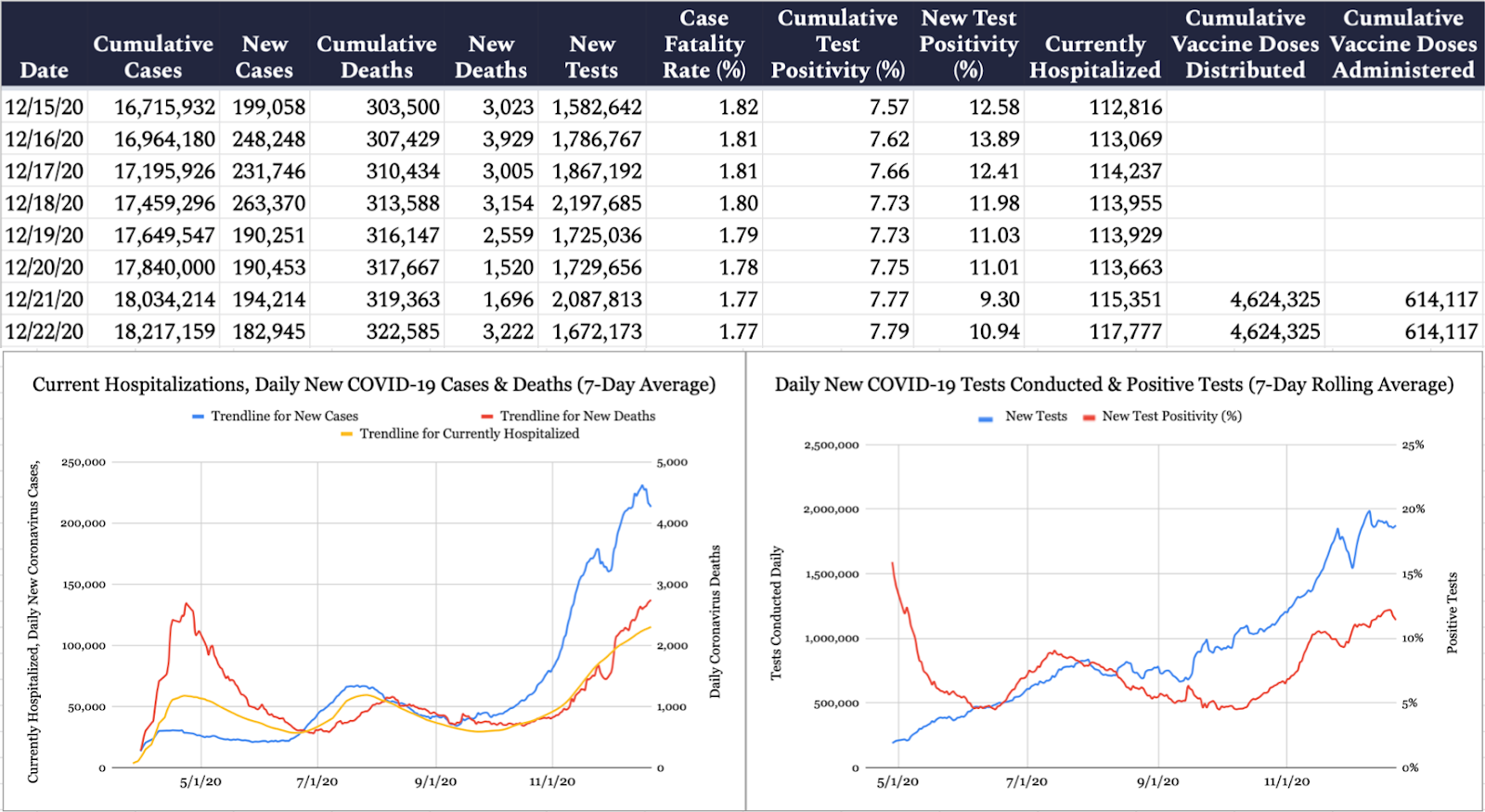Happy Wednesday! And happy Festivus for the rest of us—go get the pole out of the crawl space!
Quick Hits: Today’s Top Stories
-
Less than 24 hours after Congress approved a massive omnibus bill that included $900 billion in coronavirus relief, President Trump tweeted out a video in which he called the package—which his administration played a large role in negotiating—a “disgrace,” asking Congress to increase the size of the legislation’s stimulus checks from $600 per person to $2,000. Democratic leaders signaled they are on board with the change, but Republicans have blocked previous attempts to increase the size of the checks. It remains unclear if Trump will actually veto the package, but it passed both chambers of Congress with veto-proof majorities.
-
Israel’s government collapsed on Tuesday when the country’s parliament dissolved itself after failing to approve an annual budget. The development triggers a national election—the fourth in just two years—scheduled for March 23.
-
President Trump announced Tuesday night he had granted full pardons to 15 people and commuted the sentences of five more. Among those receiving clemency were two former GOP representatives who were very early Trump supporters—Rep. Duncan Hunter (pled guilty to misusing campaign funds) and Rep. Chris Collins (pled guilty to insider trading)—a Trump campaign official, George Papadopoulos (pled guilty to lying to the FBI), and four former Blackwater security contractors convicted on charges ranging from first degree murder to voluntary manslaughter following their involvement in the 2007 shooting of Iraqi civilians.
-
The Justice Department sued Walmart on Tuesday, alleging the company contributed to the nationwide opioid crisis by failing to adequately screen questionable prescriptions. Walmart responded by calling the suit a “transparent attempt to shift blame” from the government’s “well-documented failures in keeping bad doctors from prescribing opioids in the first place.”
-
Gov. Gavin Newsom announced Tuesday he is appointing Alex Padilla, California’s secretary of state, to fill the U.S. Senate seat being vacated by Vice President-elect Kamala Harris.
-
The United States confirmed 182,945 new cases of COVID-19 yesterday per the Johns Hopkins University COVID-19 Dashboard, with 10.9 percent of the 1,672,173 tests reported coming back positive. An additional 3,222 deaths were attributed to the virus on Tuesday, bringing the pandemic’s American death toll to 322,585. According to the COVID Tracking Project, 117,777 Americans are currently hospitalized with COVID-19. According to the Centers for Disease Control, 4,624,325 COVID-19 vaccine doses have been distributed nationwide, and 614,117 have been administered. (The CDC has not updated its vaccine dashboard since yesterday.)

Vaccine Recipients Breathe a Sigh of Relief
There have been distribution hiccups in the two weeks since the Food and Drug Administration issued an emergency use authorization for Pfizer and BioNTech’s COVID-19 vaccine (and one week since it authorized Moderna’s), but the rollout is ongoing: Millions of doses have shipped, and hundreds of thousands of Americans—primarily healthcare workers and nursing home residents—have received their first of two shots.
A few recipients of the inoculation experienced an allergic reaction to it, but that has thankfully been an exceedingly rare phenomenon thus far. Mike Pence, Joe Biden, Anthony Fauci, and many congressional leaders have received the vaccine publicly in recent days to demonstrate their confidence in its safety and efficacy.
The Dispatch spoke in recent days with several vaccine recipients—who qualify for a variety of reasons—about their experience both before and after receiving the first shot.
Dr. Beth Nesbitt has been intubating COVID patients at Inova Loudoun Hospital in Leesburg, Virginia for months, and was thrilled to finally receive the Pfizer-BioNTech vaccine this week. “I felt really happy about it, and felt like we’re coming out of the shadow of this pandemic,” Nesbitt told The Dispatch.
Her employer’s vaccine prioritization scheme bumped healthcare workers who interact face to face with COVID patients on a daily basis to the front of the line. Next, she said, are people who work in the hospital but don’t necessarily interface with patients: Housekeeping, cafeteria employees, etc.
The vaccine will bring peace of mind to these healthcare workers, but it won’t necessarily change much about their day-to-day protocols. Nesbitt said that she and her colleagues will continue to abide by universal coronavirus precautions even after Inova Loudoun has completed its vaccine rollout, given how many COVID-19 positive patients are still being admitted into her hospital on a weekly basis. “We’ll wear masks, but perhaps we won’t wear the N-95 masks every day,” she said. “Maybe we’ll just get away with a regular mask and a face shield, as opposed to the N-95 for most things.”
Dr. Kelly Colingo, an anesthesiologist from McLean, Virginia (and the mother of one of your Morning Dispatchers!) told The Dispatch she felt “honored” to be among the first Americans to receive the Pfizer-BioNTech vaccine. “I wasn’t scared at all, because I’ve seen what COVID does to people,” she said, recounting the numerous patients she’s encountered needing to be intubated or about to go into respiratory arrest. “I’ve seen so many people die and so many people be really sick. … They’re so afraid.”
Katie Dwyer—a registered nurse in the emergency room at Rush University Medical Center in Chicago—told The Dispatch she felt “a huge relief” as she was driving home from her shift the day she received her COVID-19 vaccine. Dwyer said that some of her coworkers experienced a mild headache after getting it, but that she personally experienced no side effects. “My arm was just pretty sore the next few days after, but that’s how it felt with any other vaccine I’ve gotten,” Dwyer said. “So I actually felt really good—experienced no side effects at all.”
Assisted living facility staff are also thrilled to finally be able to vaccinate their high-risk residents. Michael Hicks, CEO of Sundale Nursing Home in Morgantown, West Virginia, told The Dispatch on Monday that they have already administered the first dose to nearly all of its residents. He said no one who received the vaccine exhibited any adverse reaction other than a sore arm at the injection site.
Some Americans got vaccinated months ago—when there was considerably more risk involved. They just can’t be sure whether they were injected with vaccine or saline.
Dana Mennon, a 57-year-old resident of Nashville, Tennessee, received her first dose of the Pfizer-BioNTech vaccine in early September as a participant in the company’s blind clinical trials. After she saw a newspaper ad for the vaccine study in August, Mennon said she “had not a moment’s hesitation” about enrolling as a participant. “I’m a mom,” Mennon noted. “I have three adult children, and I know it’s important to be able to get on with their lives. And the only way they can is if I do this.”
She said she experienced mild symptoms after her first dose of the vaccine in September, but came down with a 100.7 degree fever the day after receiving her second dose three weeks later. “I don’t know with 100 percent certainty that I got the real vaccine, but I don’t think a placebo would make you that sick,” Mennon said.
As a participant in the study, Mennon will continue to have her blood drawn every six months for two years to test her immune system for antibodies. “I also have an app on my phone, and every week I get a reminder, and I have to go in and indicate if I’ve had any COVID symptoms at all, which I have not,” Mennon said.
Mennon hopes that posting about her personal experience on her Facebook page will inspire confidence in the vaccine’s safety and efficacy among her friends and family. “As an American, maybe this is my small part of doing something for my country,” she said. “I’m not a scientist. I’m not a researcher. I’m not a big splash person. But hey, I can get a shot and let them follow me and see what happens.”
U.S. Military Posturing Across the Globe
The Navy conducted two strategic ship movements this week, sending vessels through the Strait of Hormuz and into the South China Sea in an effort to project American military power to Iran and China, respectively. At the same time, an Israeli submarine traversed the Suez Canal in an additional show of force directed at regional rival Iran.
The passage of an American nuclear-powered guided-missile submarine through the Strait of Hormuz and into the Persian Gulf came just days after a rocket attack targeted the U.S. embassy in Baghdad, an attack that resulted in no injuries but was suspected to be the work of an Iran-backed Iraqi militia. Monday’s submarine transit seeks to deter Iran from taking further hostile action against the U.S. or American allies in the Middle East as retaliation for the January drone strike that killed Iranian General Qassem Suleimani and Iranian-aligned Iraqi militia leader Abu Mahdi al-Muhandis.
“There’s a major concern that as we approach the one-year anniversary of the drone strike that killed Suleimani and Muhandis, the Iranians and their regional proxies—especially in Iraq—won’t be able to resist the temptation to try and avenge their deaths with a major attack that, at the same time, lets them take a parting shot at President Trump,” said John Hannah, senior counselor at the Foundation for Defense of Democracies and former national security adviser to Vice President Dick Cheney.
The strategically important passageway separates Iran from the Arabian Peninsula and transports about a fifth of the world’s oil supplies. By publicizing the passage of a naval submarine—armed with 154 Tomahawk cruise missiles and escorted by two U.S. warships—the Navy said it was signaling to Iran its willingness to protect America’s regional allies and interests by unleashing the “full spectrum of capabilities to remain ready to defend against any threat at any time.” The Navy’s posturing also follows the Air Force’s flight of nuclear-capable B-52 bombers to the Persian Gulf last month.
Reports also emerged Monday that an Israeli Defense Forces submarine traversed the Suez Canal in an effort to deter Iranian retaliation for the killing of nuclear scientist Mohsen Fakhrizadeh.
“Recently, we have heard increased threats from Iran against the State of Israel,” IDF Chief of Staff Aviv Kohavi said Monday. “The IDF will forcefully attack anyone who takes part, from near or far, in activities against the State of Israel or Israeli targets. I am saying this plainly and am describing the situation as it is—the response and all the plans have been prepared and practiced.”
“Through both their public statements and military deployments, Washington and Jerusalem are seeking to disabuse the Iranians of any idea that they will be able to harm U.S. or Israeli interests without suffering a very high price,” Hannah said. “They’re trying to make it clear that any benefit Iran thinks it could gain will be far outweighed by the military punishment that will be inflicted on it.”
In addition to serving as a deterrent, Egypt’s approval of Israel’s passage through the Suez Canal, which connects the Eastern Mediterranean to the Red Sea—and by extension, to the Persian Gulf—marks an important milestone in the geopolitical realignment of the Middle East.
“It reminds the Iranians that they are increasingly isolated in the region because of the strategic realignment that’s been underway for some time, but which the Trump administration—to its credit—capitalized on in brokering the accords between Bahrain, UAE, and Israel; and then more recently Morocco, Sudan, and Israel,” Eric Edelman, former U.S. ambassador to Turkey, told The Dispatch.
On the other side of the world, the USS John McCain “asserted navigational rights” through a Freedom of Navigation Operation (FONOP) in the South China Sea. Per a U.S. Navy statement, the transit of the U.S. destroyer sought to challenge “restrictions on the innocent passage imposed by China, Vietnam, and Taiwan”— each of which require permission or prior notification before foreign military vessels are permitted to move through the area.
“More than anything it is a reminder of the U.S.’ rejection of Chinese claims over the South China Sea and, more importantly, willingness to challenge them,” said Fred Rocafort, a legal expert on China and former diplomat. “As we have seen with other territorial disputes around the world, verbal opposition alone is unlikely to deter countries making forceful claims.”
Just as diplomacy isn’t the sole component of a successful foreign policy, neither is military posturing.
“Displays of force do not work as isolated tactics. But proponents of diplomacy must understand that rogue regimes only take diplomacy seriously if they face the threat of something worse to come,” Michael Rubin, an expert on Iran at the American Enterprise Institute, told The Dispatch. “The best way to ensure peace and stability is to show adversaries in Tehran, Moscow, and Beijing that they cannot walk all over the United States, its allies, or interfere with the right of passage in international waters.”
Is the collective ratcheting up of military exercises by the U.S. and allies part of a broader effort to deter adversaries amid the presidential transition, or merely a series of disconnected moves attuned to distinct regional demands?
In all likelihood, it’s the latter. “While there’s always concern that U.S. adversaries might try to take advantage of a transition between two administrations, this sort of aggressive signaling and effort to bolster deterrence is almost always driven more by specific events and intelligence-based threats,” Hannah said.
Worth Your Time
-
In a counterintuitive and thoughtful piece for FiveThirtyEight, American Enterprise Institute research fellow Daniel Cox advocates for Republicans and Democrats arguing more, not less. “Most Americans avoid talking politics at family get-togethers … because they worry that political disagreements will ruin the holidays. But this is a mistake,” he writes. “At its heart, political disagreement is actually critical to a democracy, so when we’re able to have these kinds of disagreements with people we know and trust, like family, we should.” Cox notes that, “given the polarized era we live in, though, we find ourselves increasingly isolated from those we disagree with, and political disagreement is surprisingly rare.” But researchers have found that conversations across the political divide have societal benefits. “After just a few days of talking to people with different political beliefs,” Cox writes, pointing to a University of Chicago study, “participants expressed considerably more favorable views about their political opponents.”
-
As more and more data from last month’s election trickles in, the post-election analyses are getting better and better. This one—from Amy Walter of the Cook Political Report—uses the outcome in battleground states in 2012 and 2020 to look ahead to 2024. “After every presidential election, we use the performance of the two major candidates as a way to assess which states will be in play for the next election,” she writes. “While each campaign is different—and each candidate brings his/her own unique coalition to the polls—it’s also true that some states are more elastic (have shown real change over the years), while others are more rigid. As the two parties think about making investments for the future, they will need to assess what kind of return they can get for their investments.”
Presented Without Comment
Also Presented Without Comment
Toeing the Company Line
-
David has a simple Christmas wish this year: Can everyone chill the heck out? Decrying the daily churn from meaningless outrage to meaningless outrage, David implores readers to not get so worked up about the daily news cycle. “No, you don’t chill out about everything. Of course not. Some things are truly terrible and worth our outrage,” he writes in his latest French Press(🔒). “But in most cases, chilling out is a public service. ‘A guy wrote a trollish piece about the future first lady!?!’ Oh really? Perhaps we should ignore it so it doesn’t get clicks.”
-
If you attended our virtual What’s Next event last month, you can skip the latest Remnant podcast. But for those of you who didn’t, tune in for a conversation between Jonah and Nebraska Sen. Ben Sasse about the election results, political addiction, and charges that Sasse limited his criticism of President Trump during his Republican primary.
-
In the final Sweep of 2020, Sarah looks ahead to the redistricting wars to come. The results of this year’s census will lead to two major fights, she points out: How many seats each state gets in the House of Representatives (and subsequently, their number of electoral votes), and congressional redistricting.
-
Scott Lincicome’s Capitolism newsletter this week (🔒) took a look at housing costs, and why they are rising so much in some parts of the country. As with most economic questions, the answer is complicated. From land use regulation to building costs (see: tariffs, fees) to taxes, Scott breaks it all down, and comes to a straightforward conclusion: “If you want lower home prices and rents, build more housing.”
Let Us Know
What is a gift you’re hoping to receive this holiday season? What gift are you most excited to give to someone else? (Don’t answer that second one if the recipient is also a TMD reader!)
Alternatively, if you celebrate Festivus: Air your grievances!
Reporting by Declan Garvey (@declanpgarvey), Andrew Egger (@EggerDC), Haley Byrd Wilt (@byrdinator), Audrey Fahlberg (@FahlOutBerg), Charlotte Lawson (@charlotteUVA), and Steve Hayes (@stephenfhayes).







Please note that we at The Dispatch hold ourselves, our work, and our commenters to a higher standard than other places on the internet. We welcome comments that foster genuine debate or discussion—including comments critical of us or our work—but responses that include ad hominem attacks on fellow Dispatch members or are intended to stoke fear and anger may be moderated.
With your membership, you only have the ability to comment on The Morning Dispatch articles. Consider upgrading to join the conversation everywhere.